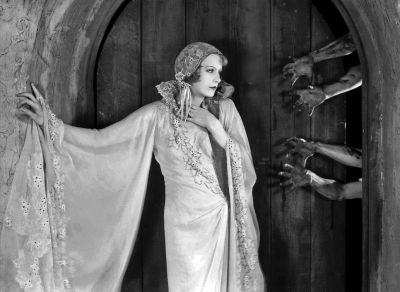
THE TEMPTRESS
(La tentatrice, USA/1926) R.: Fred Niblo. D.: 107'. Did. inglesi
T. it.: La tentatrice. Sog.: dal romanzo La tierra de todos di Vicente Blasco Ibañez. Scen.: Dorothy Farnum. F.: William Daniels, Tony Gaudio. Scgf.: Cedric Gibbons, James Basevi. Int.: Greta Garbo (Elena di Torrebianca), Antonio Moreno (Manuel Robledo), Lionel Barrymore (Canterac), Marc McDermott (Fontenoy), Armad Caliz (marchese di Torrebianca), Roy D'Arcy (Manos duras). Prod.: Irving Thalberg per MGM 35mm. D.: 117' a 24 f/s. Bn. Didascalie inglesi / English intertitles
Da: Warner Bros. Restaurato da Warner Bros. a partire dal negativo camera originale. La copia finale è stata stampata su pellicola 35mm controtipo positivo / Restored by Warner Bros. from the original camera negatives. Final answer print was made on 35mm fine grain master positive stock
Introduce Ned Price (Warner Bros.)
Accompagnamento al piano di Donald Sosin
The Temptress dovrebbe essere un film di Mauritz Stiller; ma il regista svedese viene licenziato dopo dieci giorni di riprese, e al suo posto arriva Fred Niblo. Di stilleriano resta, pare, la ricchezza barocca e l'accurata articolazione di piani delle prime sequenze, dove una festa mascherata offre a Garbo l'occasione di annunciare la propria bellezza con una breve suspense, di concertarne la rivelazione: supplicata dallo sconosciuto che ha appena incontrato, si toglie infine la maschera, e vediamo il riflesso abbagliante del suo viso nel controcampo, nella luce che d'improvviso piove sulla meraviglia di lui (si prolunga ancora un attimo la delizia dell'attesa: Garbo alza molto lentamente lo sguardo). Tentatrice, seduttrice passiva e distruttiva, questa donna è al centro di un'incontrollata, isterica circolazione amorosa. Ma come accadrà tante volte ancora (La donna misteriosa, Il destino), in realtà Garbo è sola. The Temptress sbalza questa solitudine sullo sfondo delle grandi sale, tombe di lusso borghese, freddamente illuminate nella loro profondità scandita da scaloni e tende. In modo enigmatico e irriducibile, il suo amore va solo all'uomo incontrato nella notte di festa, per sempre: è lui, invece, a perdersi nell'intrico delle convenzioni sociali, delle parate matrimoniali, dell'orgoglio maschile, e a perderla. Garbo lo vede partire e appoggia la bocca sull'anello che lui le ha regalato: è la sensualità del contatto con gli oggetti simbolici che tornerà in La carne e il diavolo e poi in La regina Cristina. Eppure Garbo sarà al culmine del suo drammatico, fotogenico splendore nell'ultima scena, che è una scena di disfatta. Ci sono state altre feste, altri carnevali, altri innamorati delusi, una morte in duello, la diga che esplode, lei assurdamente vestita di pizzo bianco, Antonio Moreno tutto fango e furia, che grida "Non mi distruggerai". Infatti è lei a distruggersi, per vocazione. Si rincontrano molti anni dopo, a Parigi (nel finale autorizzato, non nell'inverosimile happy end girato per essere distribuito nel caso il primo risultasse troppo deprimente), e Garbo è una clocharde di patetica eleganza, alcolizzata, smemorata, perduta. Potrebbe essere L'Absinthe di Degas e invece naturalmente è irresistibile nel pallore esausto, il basco nero, e quelle "palpebre d'amianto" (Richard Corliss) che si sollevano a fatica per guardare e non vedere: "Davvero non ricordo. Ho conosciuto tanti uomini".
Paola Cristalli
The Temptress should have been a Mauritz Stiller's movie; but the Swedish director was fired ten days after the shooting started and his place was taken by Fred Niblo. What remains of Stiller's hand is probably in the baroque richness and in the detailed articulation of frames in the first sequences, where a masked ball offers Garbo the chance to show her beauty by a brief suspense, to design the revelation. The scene where, entreated by the stranger she has just barely met, she takes away her mask at last, finds its perfect resolution, and we see the blinding reflection of her face in the light that suddenly drops on his wonderment (the mask has fallen, and for a second the joy of waiting is prolonged: Garbo raises her eyes - very slowly). Tempting, passive and destructive seducer, this woman is at the center of an incontrollable, hysterical love circle. But as it will happen in subsequent movies (The Mysterious Lady, A Woman of Affairs), Garbo is alone, etching this solitude on the background of the large funereal halls of bourgeois wealth, among grand staircases and draperies. In an enigmatic manner, her love is only for the man she has met the night of the party, forever: he's the one who gets confused in the maze of social conventions, wedding parades, male pride, and loses her. Garbo sees him leaving and kisses the rings he has given her: it's the sensuality of contact with symbolic objects, which will come back in The Flesh and the Devil and later in Queen Christina. Paradoxically Garbo will be at the apex of her dramatic and photogenic splendour in the last scene, one of defeat. Many other parties have taken place, other masked balls, other jilted lovers, a death in a duel, a dam burst up, she absurdly dressed in white lace and Antonio Moreno all mud and fury, screaming: "You will not destroy me!" She destroys herself, for a painfully aware inclination. [Spoiler alert] Many years later they would meet again in Paris (in the authorised ending, not in the improbable happy end shot to be distributed just in case the former was to be considered too depressing), and Garbo is now a pathetically elegant tramp, a forgetful and lost alcoholic. She could be just come out of Degas's L'Absinthe but she is irresistible, her pallour as weary and pearly as ever, her black bonnet, and those "asbestos eyelids" (Richard Corliss) hardly raised to look at the old lover without really seeing him: "Truly I do not remember. I have met so many men".
Paola Cristalli

Tariffe:

Numero posti: 174
Aria Condizionata
Accesso e servizi per disabili
Il nostro cinema aderisce al circuito CinemAmico: è possibile utilizzare l’applicazione MovieReading® per i film di cui è prevista audiodescrizione e/o sottotitolazione sull'applicazione.
Tel. 051 2195311











